IT Ethics: Analysis of Ethical Dilemmas and ACS Code of Conduct Report
VerifiedAdded on 2022/09/21
|6
|1948
|19
Report
AI Summary
This report examines an ethical dilemma faced by a junior developer in an IT company, focusing on the violation of the Australian Computer Society (ACS) Code of Ethics. The scenario involves a junior developer who, during a client call, promises software amendments without consulting senior authorities, thus overriding the positional hierarchy and potentially impacting project budget and timelines. The report analyzes this situation through the lens of the ACS Code, highlighting breaches of honesty, professionalism, and public interest. It evaluates three potential responses from the project manager and recommends a course of action that aligns with ethical principles, emphasizing the importance of maintaining hierarchy, ensuring client needs are met responsibly, and adhering to professional conduct to avoid ethical pitfalls. The report concludes by reinforcing the significance of ethical decision-making in the IT sector to ensure public trust and maintain the integrity of the profession, referencing several academic sources to support its analysis.
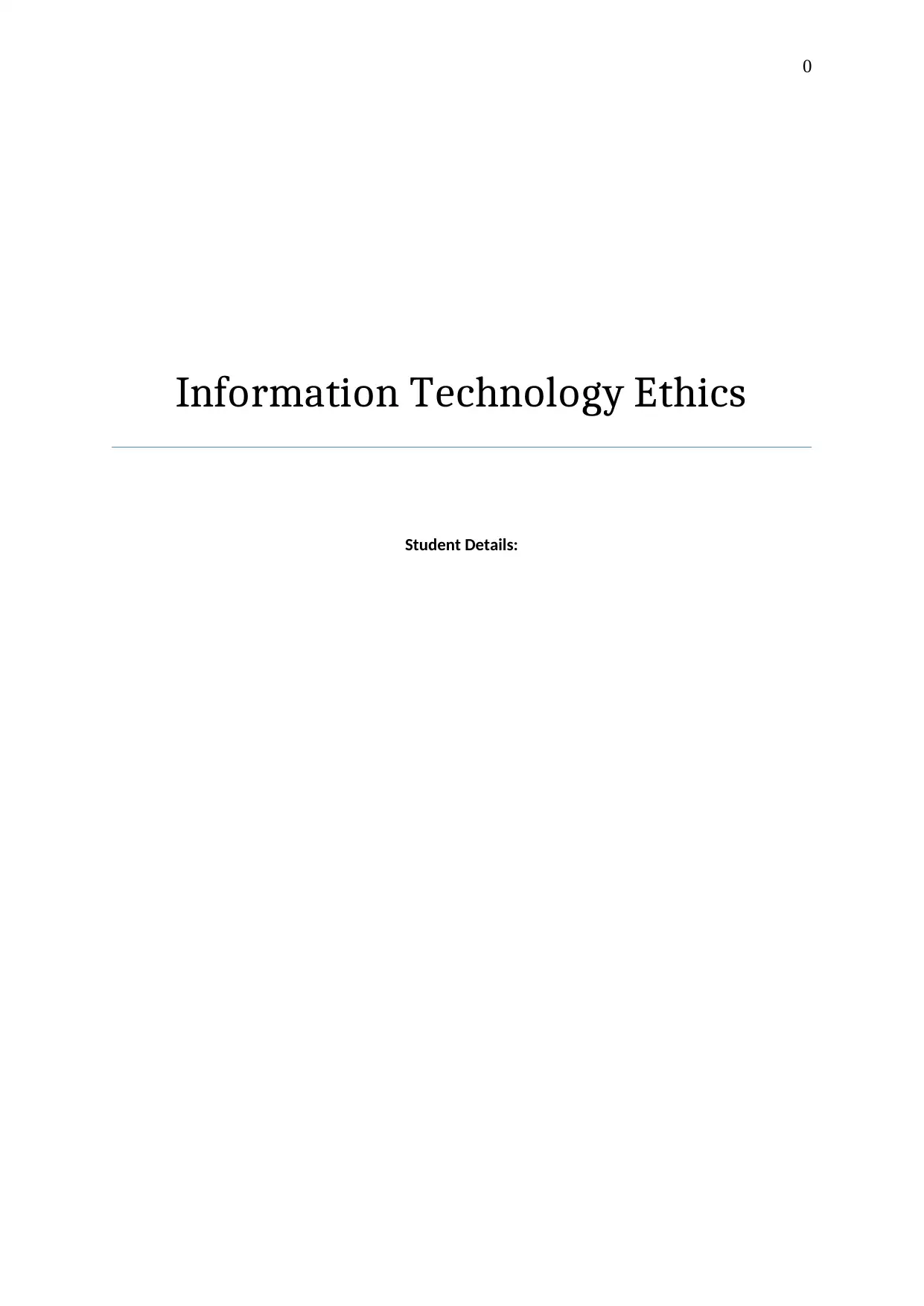
0
Information Technology Ethics
Student Details:
Information Technology Ethics
Student Details:
Paraphrase This Document
Need a fresh take? Get an instant paraphrase of this document with our AI Paraphraser
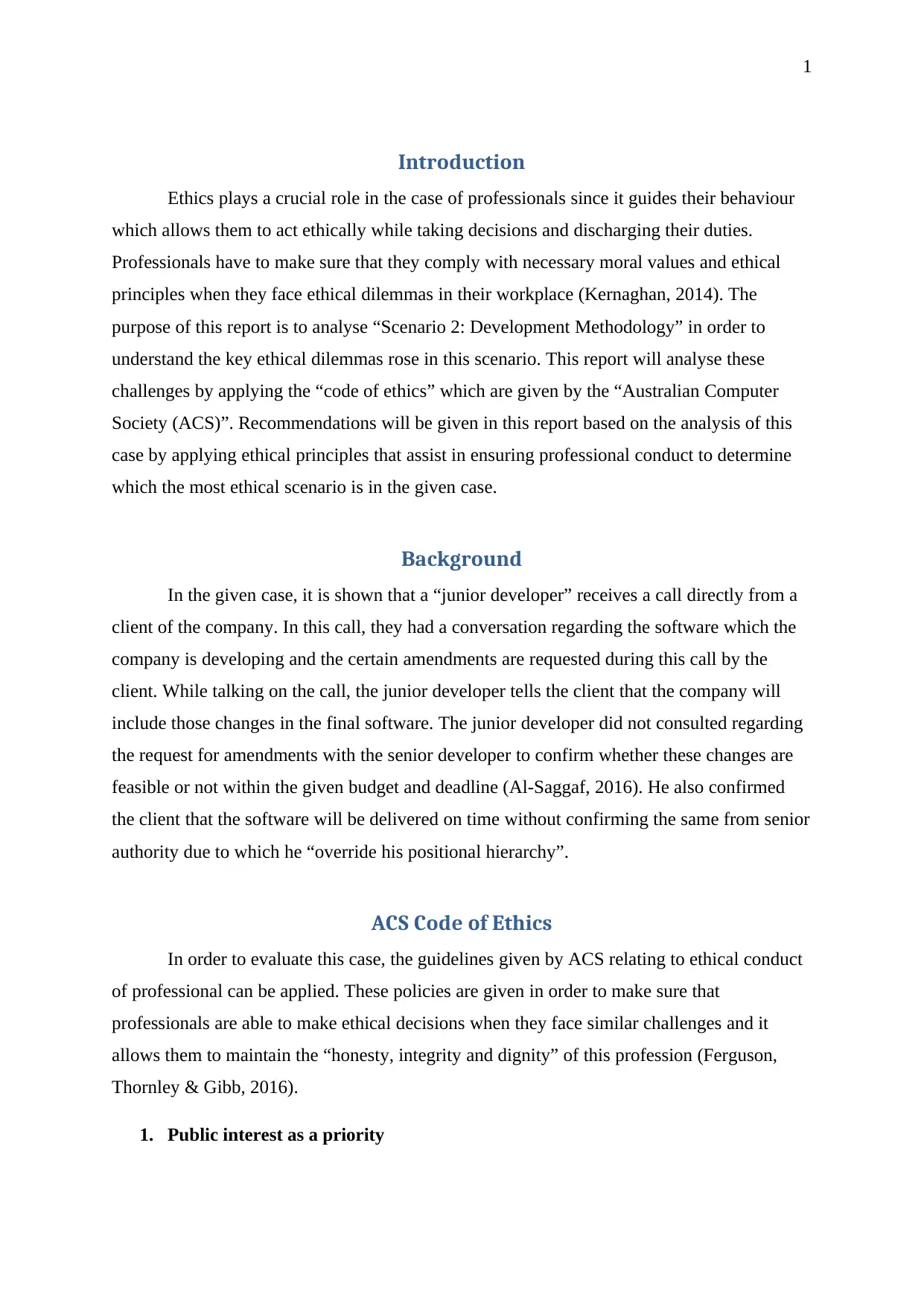
1
Introduction
Ethics plays a crucial role in the case of professionals since it guides their behaviour
which allows them to act ethically while taking decisions and discharging their duties.
Professionals have to make sure that they comply with necessary moral values and ethical
principles when they face ethical dilemmas in their workplace (Kernaghan, 2014). The
purpose of this report is to analyse “Scenario 2: Development Methodology” in order to
understand the key ethical dilemmas rose in this scenario. This report will analyse these
challenges by applying the “code of ethics” which are given by the “Australian Computer
Society (ACS)”. Recommendations will be given in this report based on the analysis of this
case by applying ethical principles that assist in ensuring professional conduct to determine
which the most ethical scenario is in the given case.
Background
In the given case, it is shown that a “junior developer” receives a call directly from a
client of the company. In this call, they had a conversation regarding the software which the
company is developing and the certain amendments are requested during this call by the
client. While talking on the call, the junior developer tells the client that the company will
include those changes in the final software. The junior developer did not consulted regarding
the request for amendments with the senior developer to confirm whether these changes are
feasible or not within the given budget and deadline (Al-Saggaf, 2016). He also confirmed
the client that the software will be delivered on time without confirming the same from senior
authority due to which he “override his positional hierarchy”.
ACS Code of Ethics
In order to evaluate this case, the guidelines given by ACS relating to ethical conduct
of professional can be applied. These policies are given in order to make sure that
professionals are able to make ethical decisions when they face similar challenges and it
allows them to maintain the “honesty, integrity and dignity” of this profession (Ferguson,
Thornley & Gibb, 2016).
1. Public interest as a priority
Introduction
Ethics plays a crucial role in the case of professionals since it guides their behaviour
which allows them to act ethically while taking decisions and discharging their duties.
Professionals have to make sure that they comply with necessary moral values and ethical
principles when they face ethical dilemmas in their workplace (Kernaghan, 2014). The
purpose of this report is to analyse “Scenario 2: Development Methodology” in order to
understand the key ethical dilemmas rose in this scenario. This report will analyse these
challenges by applying the “code of ethics” which are given by the “Australian Computer
Society (ACS)”. Recommendations will be given in this report based on the analysis of this
case by applying ethical principles that assist in ensuring professional conduct to determine
which the most ethical scenario is in the given case.
Background
In the given case, it is shown that a “junior developer” receives a call directly from a
client of the company. In this call, they had a conversation regarding the software which the
company is developing and the certain amendments are requested during this call by the
client. While talking on the call, the junior developer tells the client that the company will
include those changes in the final software. The junior developer did not consulted regarding
the request for amendments with the senior developer to confirm whether these changes are
feasible or not within the given budget and deadline (Al-Saggaf, 2016). He also confirmed
the client that the software will be delivered on time without confirming the same from senior
authority due to which he “override his positional hierarchy”.
ACS Code of Ethics
In order to evaluate this case, the guidelines given by ACS relating to ethical conduct
of professional can be applied. These policies are given in order to make sure that
professionals are able to make ethical decisions when they face similar challenges and it
allows them to maintain the “honesty, integrity and dignity” of this profession (Ferguson,
Thornley & Gibb, 2016).
1. Public interest as a priority
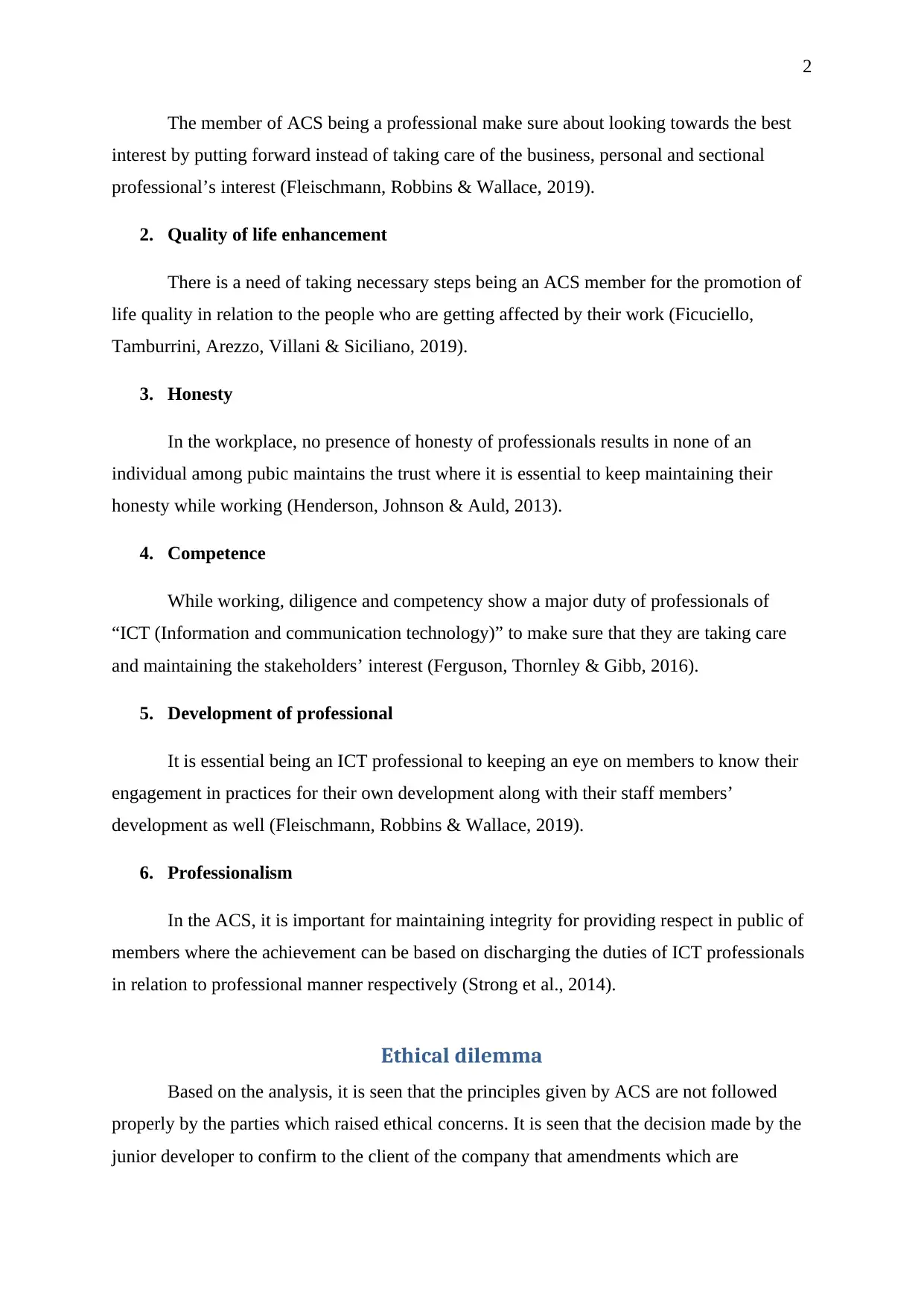
2
The member of ACS being a professional make sure about looking towards the best
interest by putting forward instead of taking care of the business, personal and sectional
professional’s interest (Fleischmann, Robbins & Wallace, 2019).
2. Quality of life enhancement
There is a need of taking necessary steps being an ACS member for the promotion of
life quality in relation to the people who are getting affected by their work (Ficuciello,
Tamburrini, Arezzo, Villani & Siciliano, 2019).
3. Honesty
In the workplace, no presence of honesty of professionals results in none of an
individual among pubic maintains the trust where it is essential to keep maintaining their
honesty while working (Henderson, Johnson & Auld, 2013).
4. Competence
While working, diligence and competency show a major duty of professionals of
“ICT (Information and communication technology)” to make sure that they are taking care
and maintaining the stakeholders’ interest (Ferguson, Thornley & Gibb, 2016).
5. Development of professional
It is essential being an ICT professional to keeping an eye on members to know their
engagement in practices for their own development along with their staff members’
development as well (Fleischmann, Robbins & Wallace, 2019).
6. Professionalism
In the ACS, it is important for maintaining integrity for providing respect in public of
members where the achievement can be based on discharging the duties of ICT professionals
in relation to professional manner respectively (Strong et al., 2014).
Ethical dilemma
Based on the analysis, it is seen that the principles given by ACS are not followed
properly by the parties which raised ethical concerns. It is seen that the decision made by the
junior developer to confirm to the client of the company that amendments which are
The member of ACS being a professional make sure about looking towards the best
interest by putting forward instead of taking care of the business, personal and sectional
professional’s interest (Fleischmann, Robbins & Wallace, 2019).
2. Quality of life enhancement
There is a need of taking necessary steps being an ACS member for the promotion of
life quality in relation to the people who are getting affected by their work (Ficuciello,
Tamburrini, Arezzo, Villani & Siciliano, 2019).
3. Honesty
In the workplace, no presence of honesty of professionals results in none of an
individual among pubic maintains the trust where it is essential to keep maintaining their
honesty while working (Henderson, Johnson & Auld, 2013).
4. Competence
While working, diligence and competency show a major duty of professionals of
“ICT (Information and communication technology)” to make sure that they are taking care
and maintaining the stakeholders’ interest (Ferguson, Thornley & Gibb, 2016).
5. Development of professional
It is essential being an ICT professional to keeping an eye on members to know their
engagement in practices for their own development along with their staff members’
development as well (Fleischmann, Robbins & Wallace, 2019).
6. Professionalism
In the ACS, it is important for maintaining integrity for providing respect in public of
members where the achievement can be based on discharging the duties of ICT professionals
in relation to professional manner respectively (Strong et al., 2014).
Ethical dilemma
Based on the analysis, it is seen that the principles given by ACS are not followed
properly by the parties which raised ethical concerns. It is seen that the decision made by the
junior developer to confirm to the client of the company that amendments which are
⊘ This is a preview!⊘
Do you want full access?
Subscribe today to unlock all pages.

Trusted by 1+ million students worldwide
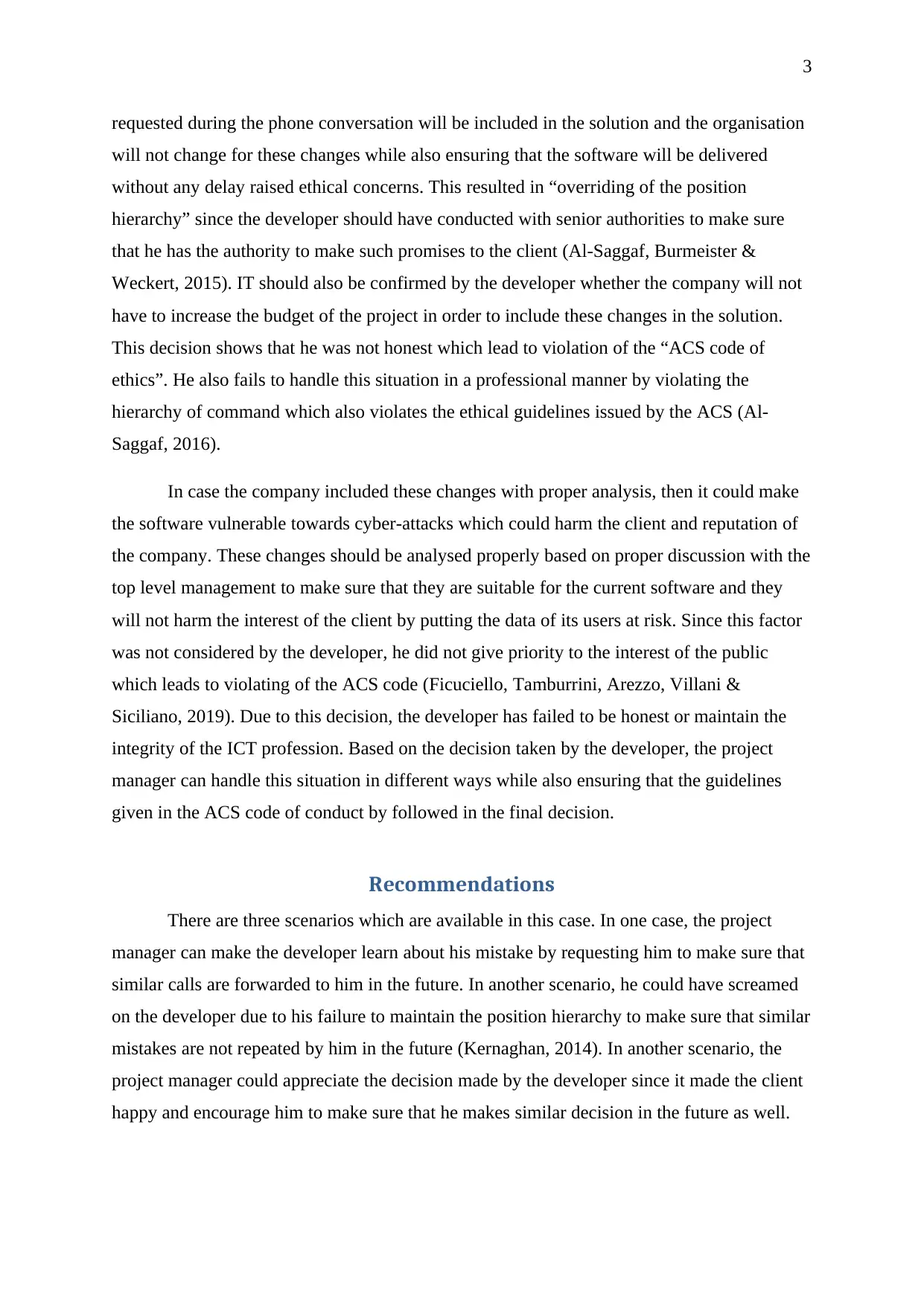
3
requested during the phone conversation will be included in the solution and the organisation
will not change for these changes while also ensuring that the software will be delivered
without any delay raised ethical concerns. This resulted in “overriding of the position
hierarchy” since the developer should have conducted with senior authorities to make sure
that he has the authority to make such promises to the client (Al-Saggaf, Burmeister &
Weckert, 2015). IT should also be confirmed by the developer whether the company will not
have to increase the budget of the project in order to include these changes in the solution.
This decision shows that he was not honest which lead to violation of the “ACS code of
ethics”. He also fails to handle this situation in a professional manner by violating the
hierarchy of command which also violates the ethical guidelines issued by the ACS (Al-
Saggaf, 2016).
In case the company included these changes with proper analysis, then it could make
the software vulnerable towards cyber-attacks which could harm the client and reputation of
the company. These changes should be analysed properly based on proper discussion with the
top level management to make sure that they are suitable for the current software and they
will not harm the interest of the client by putting the data of its users at risk. Since this factor
was not considered by the developer, he did not give priority to the interest of the public
which leads to violating of the ACS code (Ficuciello, Tamburrini, Arezzo, Villani &
Siciliano, 2019). Due to this decision, the developer has failed to be honest or maintain the
integrity of the ICT profession. Based on the decision taken by the developer, the project
manager can handle this situation in different ways while also ensuring that the guidelines
given in the ACS code of conduct by followed in the final decision.
Recommendations
There are three scenarios which are available in this case. In one case, the project
manager can make the developer learn about his mistake by requesting him to make sure that
similar calls are forwarded to him in the future. In another scenario, he could have screamed
on the developer due to his failure to maintain the position hierarchy to make sure that similar
mistakes are not repeated by him in the future (Kernaghan, 2014). In another scenario, the
project manager could appreciate the decision made by the developer since it made the client
happy and encourage him to make sure that he makes similar decision in the future as well.
requested during the phone conversation will be included in the solution and the organisation
will not change for these changes while also ensuring that the software will be delivered
without any delay raised ethical concerns. This resulted in “overriding of the position
hierarchy” since the developer should have conducted with senior authorities to make sure
that he has the authority to make such promises to the client (Al-Saggaf, Burmeister &
Weckert, 2015). IT should also be confirmed by the developer whether the company will not
have to increase the budget of the project in order to include these changes in the solution.
This decision shows that he was not honest which lead to violation of the “ACS code of
ethics”. He also fails to handle this situation in a professional manner by violating the
hierarchy of command which also violates the ethical guidelines issued by the ACS (Al-
Saggaf, 2016).
In case the company included these changes with proper analysis, then it could make
the software vulnerable towards cyber-attacks which could harm the client and reputation of
the company. These changes should be analysed properly based on proper discussion with the
top level management to make sure that they are suitable for the current software and they
will not harm the interest of the client by putting the data of its users at risk. Since this factor
was not considered by the developer, he did not give priority to the interest of the public
which leads to violating of the ACS code (Ficuciello, Tamburrini, Arezzo, Villani &
Siciliano, 2019). Due to this decision, the developer has failed to be honest or maintain the
integrity of the ICT profession. Based on the decision taken by the developer, the project
manager can handle this situation in different ways while also ensuring that the guidelines
given in the ACS code of conduct by followed in the final decision.
Recommendations
There are three scenarios which are available in this case. In one case, the project
manager can make the developer learn about his mistake by requesting him to make sure that
similar calls are forwarded to him in the future. In another scenario, he could have screamed
on the developer due to his failure to maintain the position hierarchy to make sure that similar
mistakes are not repeated by him in the future (Kernaghan, 2014). In another scenario, the
project manager could appreciate the decision made by the developer since it made the client
happy and encourage him to make sure that he makes similar decision in the future as well.
Paraphrase This Document
Need a fresh take? Get an instant paraphrase of this document with our AI Paraphraser
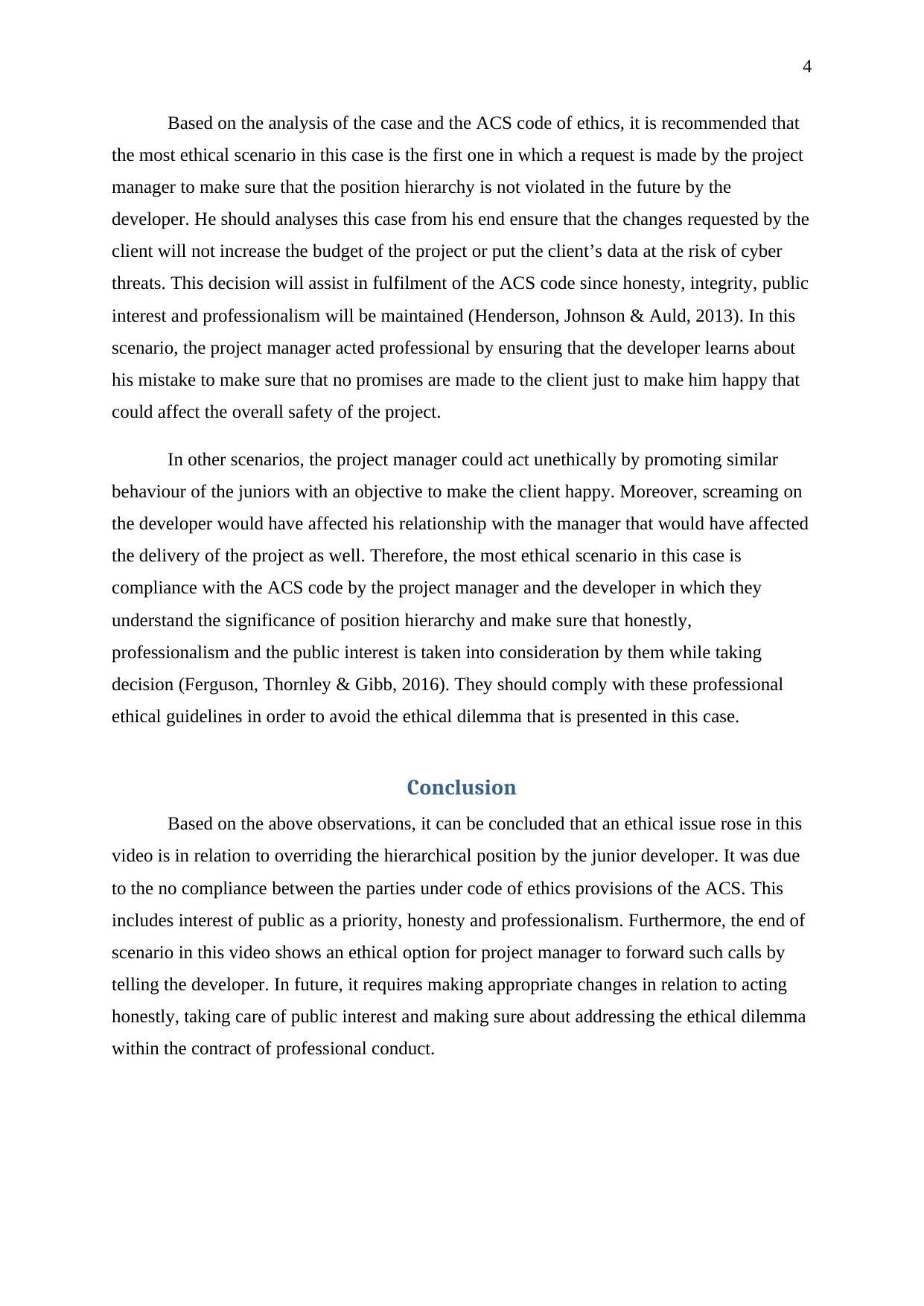
4
Based on the analysis of the case and the ACS code of ethics, it is recommended that
the most ethical scenario in this case is the first one in which a request is made by the project
manager to make sure that the position hierarchy is not violated in the future by the
developer. He should analyses this case from his end ensure that the changes requested by the
client will not increase the budget of the project or put the client’s data at the risk of cyber
threats. This decision will assist in fulfilment of the ACS code since honesty, integrity, public
interest and professionalism will be maintained (Henderson, Johnson & Auld, 2013). In this
scenario, the project manager acted professional by ensuring that the developer learns about
his mistake to make sure that no promises are made to the client just to make him happy that
could affect the overall safety of the project.
In other scenarios, the project manager could act unethically by promoting similar
behaviour of the juniors with an objective to make the client happy. Moreover, screaming on
the developer would have affected his relationship with the manager that would have affected
the delivery of the project as well. Therefore, the most ethical scenario in this case is
compliance with the ACS code by the project manager and the developer in which they
understand the significance of position hierarchy and make sure that honestly,
professionalism and the public interest is taken into consideration by them while taking
decision (Ferguson, Thornley & Gibb, 2016). They should comply with these professional
ethical guidelines in order to avoid the ethical dilemma that is presented in this case.
Conclusion
Based on the above observations, it can be concluded that an ethical issue rose in this
video is in relation to overriding the hierarchical position by the junior developer. It was due
to the no compliance between the parties under code of ethics provisions of the ACS. This
includes interest of public as a priority, honesty and professionalism. Furthermore, the end of
scenario in this video shows an ethical option for project manager to forward such calls by
telling the developer. In future, it requires making appropriate changes in relation to acting
honestly, taking care of public interest and making sure about addressing the ethical dilemma
within the contract of professional conduct.
Based on the analysis of the case and the ACS code of ethics, it is recommended that
the most ethical scenario in this case is the first one in which a request is made by the project
manager to make sure that the position hierarchy is not violated in the future by the
developer. He should analyses this case from his end ensure that the changes requested by the
client will not increase the budget of the project or put the client’s data at the risk of cyber
threats. This decision will assist in fulfilment of the ACS code since honesty, integrity, public
interest and professionalism will be maintained (Henderson, Johnson & Auld, 2013). In this
scenario, the project manager acted professional by ensuring that the developer learns about
his mistake to make sure that no promises are made to the client just to make him happy that
could affect the overall safety of the project.
In other scenarios, the project manager could act unethically by promoting similar
behaviour of the juniors with an objective to make the client happy. Moreover, screaming on
the developer would have affected his relationship with the manager that would have affected
the delivery of the project as well. Therefore, the most ethical scenario in this case is
compliance with the ACS code by the project manager and the developer in which they
understand the significance of position hierarchy and make sure that honestly,
professionalism and the public interest is taken into consideration by them while taking
decision (Ferguson, Thornley & Gibb, 2016). They should comply with these professional
ethical guidelines in order to avoid the ethical dilemma that is presented in this case.
Conclusion
Based on the above observations, it can be concluded that an ethical issue rose in this
video is in relation to overriding the hierarchical position by the junior developer. It was due
to the no compliance between the parties under code of ethics provisions of the ACS. This
includes interest of public as a priority, honesty and professionalism. Furthermore, the end of
scenario in this video shows an ethical option for project manager to forward such calls by
telling the developer. In future, it requires making appropriate changes in relation to acting
honestly, taking care of public interest and making sure about addressing the ethical dilemma
within the contract of professional conduct.
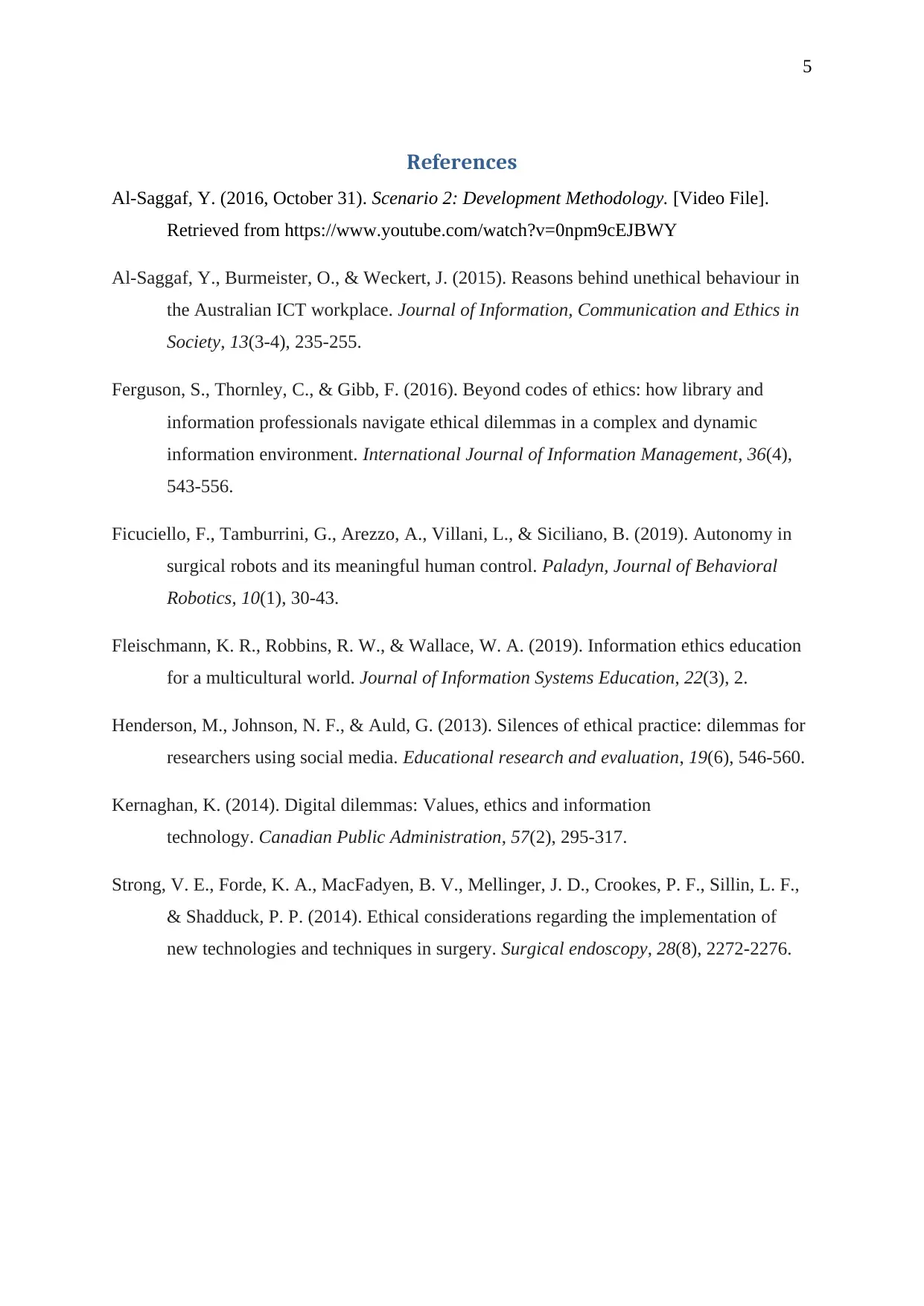
5
References
Al-Saggaf, Y. (2016, October 31). Scenario 2: Development Methodology. [Video File].
Retrieved from https://www.youtube.com/watch?v=0npm9cEJBWY
Al-Saggaf, Y., Burmeister, O., & Weckert, J. (2015). Reasons behind unethical behaviour in
the Australian ICT workplace. Journal of Information, Communication and Ethics in
Society, 13(3-4), 235-255.
Ferguson, S., Thornley, C., & Gibb, F. (2016). Beyond codes of ethics: how library and
information professionals navigate ethical dilemmas in a complex and dynamic
information environment. International Journal of Information Management, 36(4),
543-556.
Ficuciello, F., Tamburrini, G., Arezzo, A., Villani, L., & Siciliano, B. (2019). Autonomy in
surgical robots and its meaningful human control. Paladyn, Journal of Behavioral
Robotics, 10(1), 30-43.
Fleischmann, K. R., Robbins, R. W., & Wallace, W. A. (2019). Information ethics education
for a multicultural world. Journal of Information Systems Education, 22(3), 2.
Henderson, M., Johnson, N. F., & Auld, G. (2013). Silences of ethical practice: dilemmas for
researchers using social media. Educational research and evaluation, 19(6), 546-560.
Kernaghan, K. (2014). Digital dilemmas: Values, ethics and information
technology. Canadian Public Administration, 57(2), 295-317.
Strong, V. E., Forde, K. A., MacFadyen, B. V., Mellinger, J. D., Crookes, P. F., Sillin, L. F.,
& Shadduck, P. P. (2014). Ethical considerations regarding the implementation of
new technologies and techniques in surgery. Surgical endoscopy, 28(8), 2272-2276.
References
Al-Saggaf, Y. (2016, October 31). Scenario 2: Development Methodology. [Video File].
Retrieved from https://www.youtube.com/watch?v=0npm9cEJBWY
Al-Saggaf, Y., Burmeister, O., & Weckert, J. (2015). Reasons behind unethical behaviour in
the Australian ICT workplace. Journal of Information, Communication and Ethics in
Society, 13(3-4), 235-255.
Ferguson, S., Thornley, C., & Gibb, F. (2016). Beyond codes of ethics: how library and
information professionals navigate ethical dilemmas in a complex and dynamic
information environment. International Journal of Information Management, 36(4),
543-556.
Ficuciello, F., Tamburrini, G., Arezzo, A., Villani, L., & Siciliano, B. (2019). Autonomy in
surgical robots and its meaningful human control. Paladyn, Journal of Behavioral
Robotics, 10(1), 30-43.
Fleischmann, K. R., Robbins, R. W., & Wallace, W. A. (2019). Information ethics education
for a multicultural world. Journal of Information Systems Education, 22(3), 2.
Henderson, M., Johnson, N. F., & Auld, G. (2013). Silences of ethical practice: dilemmas for
researchers using social media. Educational research and evaluation, 19(6), 546-560.
Kernaghan, K. (2014). Digital dilemmas: Values, ethics and information
technology. Canadian Public Administration, 57(2), 295-317.
Strong, V. E., Forde, K. A., MacFadyen, B. V., Mellinger, J. D., Crookes, P. F., Sillin, L. F.,
& Shadduck, P. P. (2014). Ethical considerations regarding the implementation of
new technologies and techniques in surgery. Surgical endoscopy, 28(8), 2272-2276.
⊘ This is a preview!⊘
Do you want full access?
Subscribe today to unlock all pages.

Trusted by 1+ million students worldwide
1 out of 6
Related Documents
Your All-in-One AI-Powered Toolkit for Academic Success.
+13062052269
info@desklib.com
Available 24*7 on WhatsApp / Email
![[object Object]](/_next/static/media/star-bottom.7253800d.svg)
Unlock your academic potential
Copyright © 2020–2026 A2Z Services. All Rights Reserved. Developed and managed by ZUCOL.





